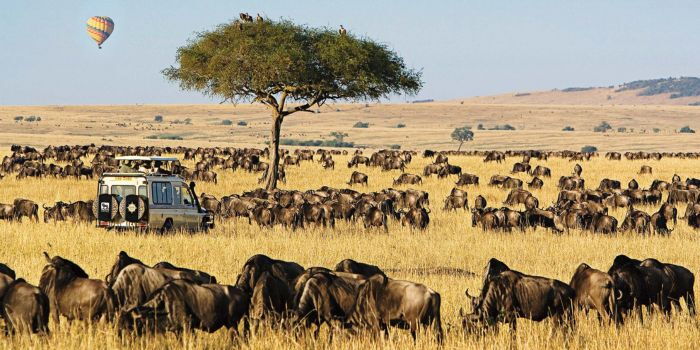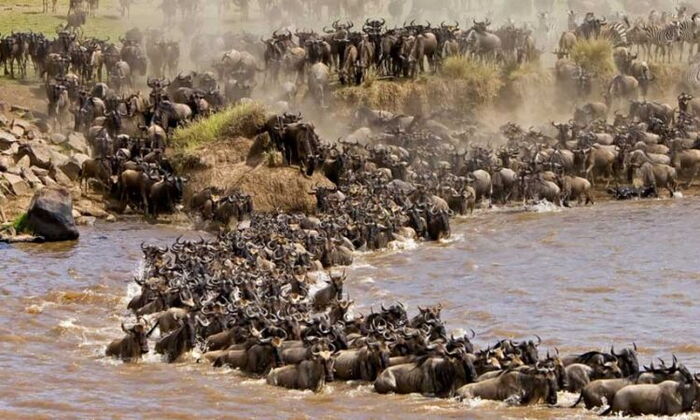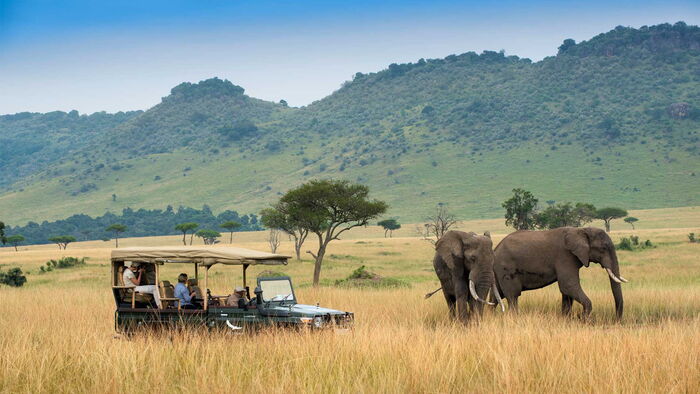A brand-new luxury safari lodge in the Maasai Mara, partly owned by an American investor, has been thrown into controversy just days before its planned grand opening.
The $3,500-per-night lodge, with suites overlooking a key river crossing for migrating wildebeest, was set to welcome its first guests on Friday, August 15. But now, the future of the project hangs in the balance.
Meitamei Olol Dapash, a well-known Kenyan wildlife conservationist and director of the Institute for Maasai Education, Research and Conservation (MERC), has gone to court to block the launch.
He argues the lodge poses a serious danger to the environment, wildlife, and the Maasai way of life. His main concern? The site sits right on a vital migration corridor between the Maasai Mara in Kenya and the Serengeti in Tanzania.
“That was the last crossing point,” Olol Dapash said. “There are other places in the middle, but you cannot tell wildebeest today you are going to cross the Sun River from the middle or south. This is a tradition, something they have done over the years and that ought to have been respected.”
The wildebeest migration is one of the world’s most famous wildlife events, drawing tourists from all over the globe. But conservationists warn that even one blocked route can disrupt the delicate balance of the ecosystem.
Dapash filed his petition on August 12, targeting not just the lodge’s owners, but also the local developer and Kenyan authorities. He claims there is no evidence an environmental impact assessment was conducted before construction began.
Local Maasai communities have also voiced their anger. They accuse wealthy investors of grabbing land and sidelining indigenous people in the name of tourism.
This dispute is not limited to Kenya. In Tanzania, similar outrage has been brewing, with protests over the eviction of tens of thousands of Maasai to make way for hunting lodges and tourist resorts.
Environmentalists say the issue is part of a bigger pattern across East Africa, luxury tourism projects promising economic benefits, but costing local people their land and wildlife their freedom to roam.
In response to the backlash, the lodge’s American owner released a statement promising that the development respects the environment. They insist that all necessary approvals were obtained before construction.
Narok County, where the lodge is located, is also standing by the project. On August 1, county officials dismissed the criticism as “unfounded,” after Dapash wrote to Marriott International urging them to reconsider their involvement.
That letter was also copied to the Governor of Narok County, sparking more debate over whether county leaders are prioritizing investor interests over conservation.
The high-end lodge offers guests private suites with expansive river views, designed so tourists can watch the wildebeest migration from their decks. But to Dapash and many others, that same luxury comes at too high a cost.
Wildlife experts warn that construction in such sensitive zones can alter animal behavior permanently. If migration routes are blocked, herds might shift paths, leading to starvation, population drops, and ecosystem collapse.
“This is not just about wildebeest,” says Dapash. “It’s about elephants, zebras, and countless other animals that rely on these corridors to survive.”
Critics argue that while tourism brings in money, it must be done responsibly, with respect for natural heritage and indigenous rights.
The court case now threatens to delay or completely halt the lodge’s opening. Conservation groups are watching closely, as the verdict could set a precedent for how East Africa handles luxury tourism projects in protected areas.
For the Maasai Mara, the stakes are high, and for the wildebeest, the next migration season could be the test of whether ancient pathways remain free or become blocked by human ambition.
As the battle between conservation and commerce plays out, one question remains: Should the price of a luxury holiday be paid in the currency of a dying migration?






